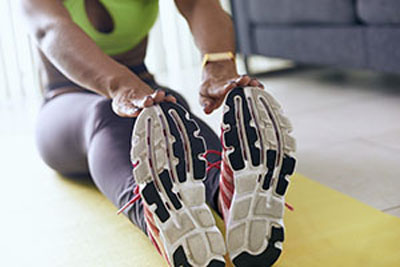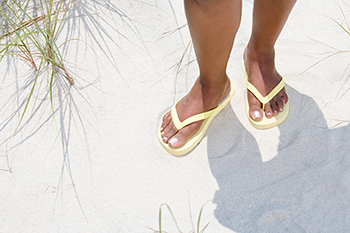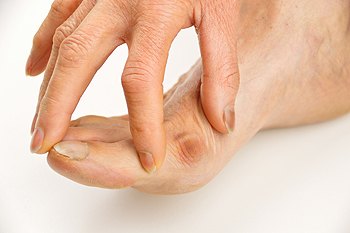Items filtered by date: November 2020
Can Cracked Heels Be Prevented?
 The foot condition that is known as cracked heels can interfere with children’s daily activities. This ailment may be caused by several factors, including an athlete’s foot infection, cold temperature, or possible skin allergies. Athlete's foot may occur as a result of sharing shoes, socks, or towels, and from wearing shoes that are made of synthetic materials. Fissures may gradually develop on the heels of the foot, and can cause severe pain and discomfort. Antibacterial soaps may initiate a skin irritation, and may cause the heels to become dry. Drinking plenty of fresh water on a daily basis may be a successful preventive measure, in addition to eating foods that are rich in vitamin A. If you would like more information about the causes of cracked heels and how to prevent them, please consult with a podiatrist who can effectively treat this condition.
The foot condition that is known as cracked heels can interfere with children’s daily activities. This ailment may be caused by several factors, including an athlete’s foot infection, cold temperature, or possible skin allergies. Athlete's foot may occur as a result of sharing shoes, socks, or towels, and from wearing shoes that are made of synthetic materials. Fissures may gradually develop on the heels of the foot, and can cause severe pain and discomfort. Antibacterial soaps may initiate a skin irritation, and may cause the heels to become dry. Drinking plenty of fresh water on a daily basis may be a successful preventive measure, in addition to eating foods that are rich in vitamin A. If you would like more information about the causes of cracked heels and how to prevent them, please consult with a podiatrist who can effectively treat this condition.
If the skin on your feet starts to crack, you may want to see a podiatrist to find treatment. If you have any concerns, contact Edward S. Pozarny DPM from Arlington Podiatry Center. Our doctor can provide the care you need to keep you pain-free and on your feet.
Cracked Heels
It is important to moisturize your cracked heels in order to prevent pain, bleeding, and infection. The reason cracked heels form is because the skin on the foot is too dry to support the immense pressure placed on them. When the foot expands, the dry skin on the foot begins to split.
Ways to Help Heal Them
- Invest in a good foot cream
- Try Using Petroleum Jelly
- Ease up on Soaps
- Drink Plenty of Water
Ways to Prevent Cracked Heels
- Moisturize After Showering
- Skip a Shower
- Keep Shower Water Lukewarm
- Don’t Scrub Your Feet
If you are unsure how to proceed in treating cracked heels, seek guidance from a podiatrist. Your doctor will help you with any questions or information you may need.
If you have any questions, please feel free to contact our office located in Arlington, VA . We offer the newest diagnostic and treatment technologies for all your foot care needs.
What Flip Flops Can Do to Your Feet
 Flip flops are a popular shoe style, and many people enjoy wearing them in the warm summer months. They are constructed with flat, foam soles, and have a plastic or rubber strap that lies between the big toe and second toe. Despite the simplicity of wearing them, they could possibly cause damage to your feet. Bunions can form as a result of pulled and overstretched ligaments, and may cause severe pain and discomfort. Additionally, the majority of flip flops have little or no arch support, and this may cause conditions such as plantar fasciitis and heel spurs to arise. The possible damage that can happen to your feet from frequently wearing flip flops may outweigh the temporary ease that comes from wearing these types of shoes. If you would like more information about how flip flops can affect your feet, please consult with a podiatrist.
Flip flops are a popular shoe style, and many people enjoy wearing them in the warm summer months. They are constructed with flat, foam soles, and have a plastic or rubber strap that lies between the big toe and second toe. Despite the simplicity of wearing them, they could possibly cause damage to your feet. Bunions can form as a result of pulled and overstretched ligaments, and may cause severe pain and discomfort. Additionally, the majority of flip flops have little or no arch support, and this may cause conditions such as plantar fasciitis and heel spurs to arise. The possible damage that can happen to your feet from frequently wearing flip flops may outweigh the temporary ease that comes from wearing these types of shoes. If you would like more information about how flip flops can affect your feet, please consult with a podiatrist.
Flip-flops can cause a lot of problems for your feet. If you have any concerns about your feet or ankles, contact Edward S. Pozarny DPM from Arlington Podiatry Center. Our doctor will assist you with all of your foot and ankle needs.
Flip-Flops and Feet
Flip-flops have managed to become a summer essential for a lot of people. While the shoes may be stylish and easy to slip on and off, they can be dangerous to those who wear them too often. These shoes might protect you from fungal infections such as athlete’s foot, but they can also give you foot pain and sprained ankles if you trip while wearing them.
When Are They Okay to Wear?
Flip-flops should only be worn for very short periods of time. They can help protect your feet in places that are crawling with fungi, such as gym locker rooms. Athlete’s foot and plantar warts are two common fungi that flip-flops may help protect your feet against.
Why Are They Bad for My Feet?
These shoes do not offer any arch support, so they are not ideal for everyday use. They also do not provide shock absorption or heel cushioning which can be problematic for your feet. Additionally, you may suffer from glass cuts, puncture wounds, and stubbed toes since they offer little protection for your feet.
More Reasons Why They Are Bad for Your Feet
- They Slow You Down
- May Cause Blisters and Calluses
- Expose Your Feet to Bacteria
If you have any questions, please feel free to contact our office located in Arlington, VA . We offer the newest diagnostic and treatment technologies for all your foot care needs.
Bunions May Develop for Several Reasons
 There are several reasons why bunions may develop. These can include genetic factors, wearing shoes that do not fit correctly, a foot deformity, or from a medical condition like arthritis. A bunion is defined as a bone that protrudes from the joint in the big toe, and may cause severe pain and discomfort. Additional symptoms of a bunion can consist of swelling and redness surrounding the affected joint, and the toe may be difficult to move. After a proper diagnosis is made, which generally involves having an X-ray taken and a physical examination of the foot is performed, proper treatment can begin. Orthotics may be prescribed and it is beneficial to wear shoes that have low heels and a wide toe box. If your bunion is very painful or causing difficulty walking, it is strongly suggested that you are examined by a podiatrist.
There are several reasons why bunions may develop. These can include genetic factors, wearing shoes that do not fit correctly, a foot deformity, or from a medical condition like arthritis. A bunion is defined as a bone that protrudes from the joint in the big toe, and may cause severe pain and discomfort. Additional symptoms of a bunion can consist of swelling and redness surrounding the affected joint, and the toe may be difficult to move. After a proper diagnosis is made, which generally involves having an X-ray taken and a physical examination of the foot is performed, proper treatment can begin. Orthotics may be prescribed and it is beneficial to wear shoes that have low heels and a wide toe box. If your bunion is very painful or causing difficulty walking, it is strongly suggested that you are examined by a podiatrist.
If you are suffering from bunions, contact Edward S. Pozarny DPM of Arlington Podiatry Center. Our doctor can provide the care you need to keep you pain-free and on your feet.
What Is a Bunion?
A bunion is formed of swollen tissue or an enlargement of boney growth, usually located at the base joint of the toe that connects to the foot. The swelling occurs due to the bones in the big toe shifting inward, which impacts the other toes of the foot. This causes the area around the base of the big toe to become inflamed and painful.
Why Do Bunions Form?
Genetics – Susceptibility to bunions are often hereditary
Stress on the feet – Poorly fitted and uncomfortable footwear that places stress on feet, such as heels, can worsen existing bunions
How Are Bunions Diagnosed?
Doctors often perform two tests – blood tests and x-rays – when trying to diagnose bunions, especially in the early stages of development. Blood tests help determine if the foot pain is being caused by something else, such as arthritis, while x-rays provide a clear picture of your bone structure to your doctor.
How Are Bunions Treated?
- Refrain from wearing heels or similar shoes that cause discomfort
- Select wider shoes that can provide more comfort and reduce pain
- Anti-inflammatory and pain management drugs
- Orthotics or foot inserts
- Surgery
If you have any questions, please feel free to contact our office located in Arlington, VA . We offer the newest diagnostic and treatment technologies for all your foot care needs.
What Can Cause an Achilles Tendon Injury?
 Patients who have experienced an Achilles tendon injury are often aware of the severe pain and discomfort this can cause. It can occur from repetitive irritation, or from a sudden injury. Additionally, wearing shoes that do not fit correctly, or having an abnormal foot structure may contribute to the onset of this type of injury. The symptoms that are often associated with this condition can consist of extreme tenderness in the heel, calf, and ankle, and it can be difficult to walk. It is beneficial to consult with a podiatrist if you have endured an Achilles tendon injury. A podiatrist can guide you toward the right treatments for you.
Patients who have experienced an Achilles tendon injury are often aware of the severe pain and discomfort this can cause. It can occur from repetitive irritation, or from a sudden injury. Additionally, wearing shoes that do not fit correctly, or having an abnormal foot structure may contribute to the onset of this type of injury. The symptoms that are often associated with this condition can consist of extreme tenderness in the heel, calf, and ankle, and it can be difficult to walk. It is beneficial to consult with a podiatrist if you have endured an Achilles tendon injury. A podiatrist can guide you toward the right treatments for you.
Achilles tendon injuries need immediate attention to avoid future complications. If you have any concerns, contact Edward S. Pozarny DPM of Arlington Podiatry Center. Our doctor can provide the care you need to keep you pain-free and on your feet.
What Is the Achilles Tendon?
The Achilles tendon is a tendon that connects the lower leg muscles and calf to the heel of the foot. It is the strongest tendon in the human body and is essential for making movement possible. Because this tendon is such an integral part of the body, any injuries to it can create immense difficulties and should immediately be presented to a doctor.
What Are the Symptoms of an Achilles Tendon Injury?
There are various types of injuries that can affect the Achilles tendon. The two most common injuries are Achilles tendinitis and ruptures of the tendon.
Achilles Tendinitis Symptoms
- Inflammation
- Dull to severe pain
- Increased blood flow to the tendon
- Thickening of the tendon
Rupture Symptoms
- Extreme pain and swelling in the foot
- Total immobility
Treatment and Prevention
Achilles tendon injuries are diagnosed by a thorough physical evaluation, which can include an MRI. Treatment involves rest, physical therapy, and in some cases, surgery. However, various preventative measures can be taken to avoid these injuries, such as:
- Thorough stretching of the tendon before and after exercise
- Strengthening exercises like calf raises, squats, leg curls, leg extensions, leg raises, lunges, and leg presses
If you have any questions please feel free to contact our office located in Arlington, VA . We offer the newest diagnostic tools and technology to treat your foot and ankle needs.
